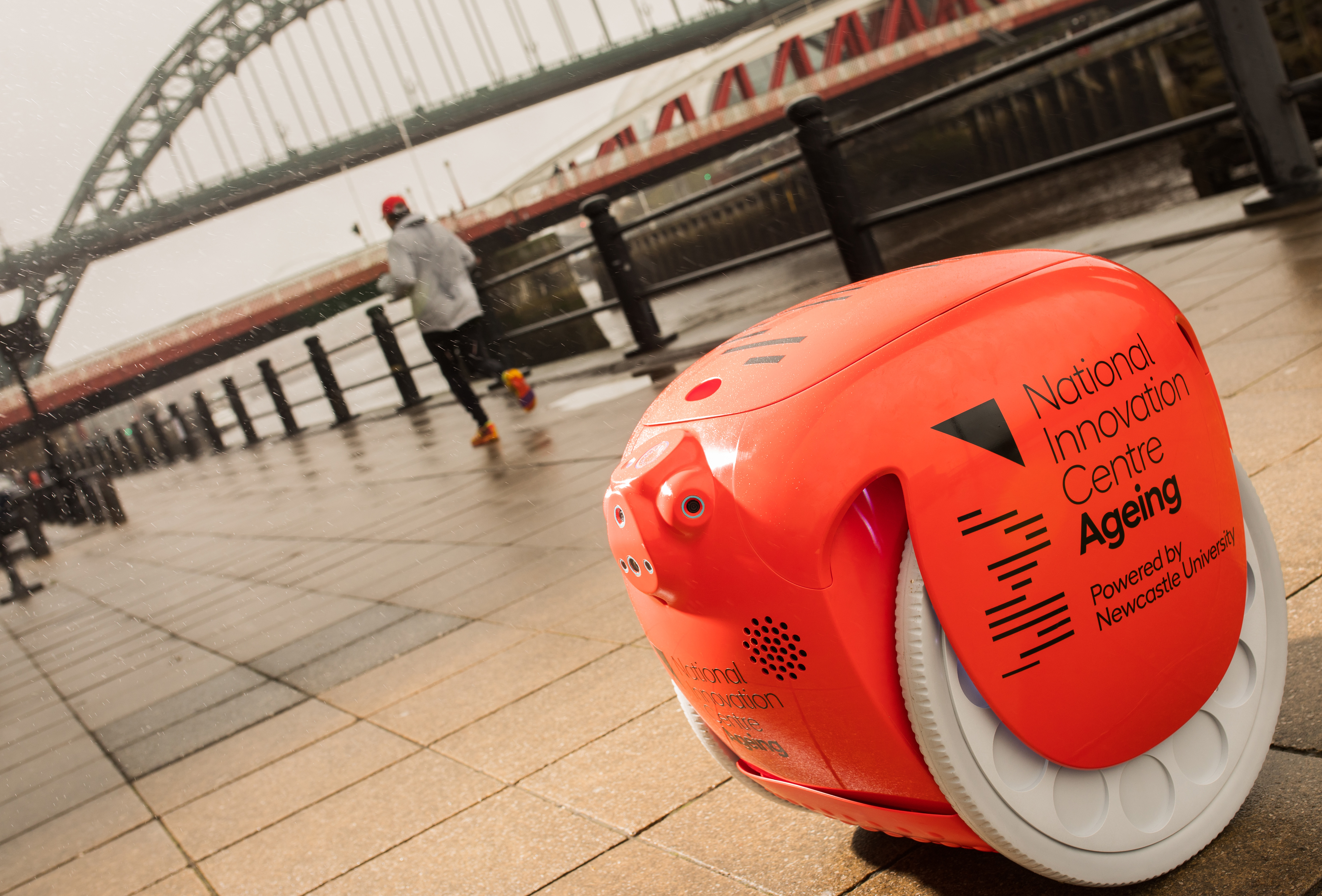
The National Innovation Centre for Ageing, based at Newcastle University, is one of the first places in the world to test out Gita® robots, which could have a big impact on the mobility and independence of older people in the future.
Gita is a first-of-its-kind robot made by Boston-based robotics company Piaggio Fast Forward (PFF) and backed by Piaggio Group, the manufacturer of the iconic Vespa scooters.
These cargo-carrying robots are designed to pair with people, freeing up their hands and following them around as they go about their day. They can carry up to 18kg of cargo, moving at up to six miles per hour for up to four hours of continuous use.
The robots can communicate with users through sound, light and touch. With 360 vision, they can "see" the user and their surroundings, allowing them to safely follow wherever the user goes.
The birth of the Gita robots
Gita robots were launched by PFF, an organisation that creates mobility solutions to empower people of all ages to interact and live independently. They were first launched for consumers in the US market at the end of 2019.
Jeffrey Schnapp, Co-Founder and Chief Visionary Officer of PFF said:
"When we started Piaggio Fast Forward, we began with an urban point of view. We aimed to design products that move the way people move and develop technology to bring robotic mobility to sidewalks and pedestrian spaces. Our robots follow people, and they help people walk further, faster and more frequently.
"Our goal is to make the world a more pedestrian-friendly space with machines that walk with us rather than replace us. The Gita robot brings people together, gives them more opportunities to connect, and makes local living easier, smarter and more fun. We are eager to see how the community members of Newcastle use Gita and watch it change their way of navigating their daily routines on foot."
Bringing the robots to Newcastle
The robots were brought to Newcastle by the National Innovation Centre for Ageing (NICA), which is based at the Helix, part of Newcastle University. NICA is the UK home of Ageing Intelligence®, bringing together data-driven insights and human experiences to help bring new products, business models and services to market.
The trial of the Gita robots forms part of the Centre's work to help facilitate a society that is better equipped to meet the opportunities and challenges of an ageing population. Their overall goal is to help create a world where we can all live smarter and healthier lives.
Testing the robots
The robots are being tested by the team at NICA in a citizen-led project that will examine human experiences and interactions with the robots to gauge how they're adopted.
The team are evaluating the robots' potential to:
- help mitigate loneliness and isolation
- boost healthy behaviour by encouraging more walking
- foster more independent and sustainable living
For example, the robots will be tested to see if they can successfully be used by older adults to shop locally and assist with carrying heavy loads.
Commenting on the project, Professor Nic Palmarini, Director of NICA, said:
"This project is about exploring if and how these technologies will be accepted by older adults and their stakeholders and how they can be part of our future urban landscape."
Future uses and considerations will play a vital part in the research being carried out. For example, in light of Covid-19, this technology could have the potential to help people keep a safe distance.
Ultimately, the end goal of the project is to understand how best to adopt these devices in cities like Newcastle, to support people to remain healthy, active, independent and connected in later life.
Professor Palmarini continued:
"At NICA we're ideally placed to take the Gitas into Newcastle, and this is one of the first cities in the world where this device will be applied to real-case scenarios involving older adults.
"This is crucial to our approach. Real interactions, with real people, tested in a real context, can help to gain qualitative, rather than quantitative, insights. This is key to helping other companies develop similar concepts based on innovative and disruptive thinking, to enhance urban mobility that meets human needs."
Enabling a more active lifestyle
It is hoped that using the Gita robots will encourage older people to walk more by giving them the confidence to venture out into their communities. This could help to enable a more active and independent lifestyle, as well as making them feel more connected with the outside world.
Professor Palmarini said:
"This exciting development could be a door to freedom for so many of our older people who need extra support but want their independence.
"Older people tend to travel and leave home less frequently; and while there has been much focus recently on electric bikes or self-driven vehicles, we believe Gita could encourage a more practical, sustainable and healthy mode of transport - walking.
"The project is about exploring if and how these technologies will be accepted by older adults and their stakeholders and how they can be part of our future urban landscape, be accessible to all and support healthy and independent living. This is just one of many projects and unique selling points that make Newcastle the epicentre of longevity innovation."
Shaping the future of mobility
Speaking about the work being carried out in Newcastle, Councillor Ged Bell, Cabinet Member for Employment and Culture at Newcastle City Council said:
"Our city has a history of innovation, and the early adoption and testing of new technologies like this will give us an insight into what our city could look like in the not-too-distant future.
"It's hard to imagine our city as a place where robots and people share the same space. From tackling social isolation to creating more walkable communities, the impact on those who live and work in our city could be profound.
"This trial will play a vital part in helping shape the future of mobility, not only in Newcastle but across the UK.
"We want to create an inclusive, sustainable and fair society where people of all ages can access products and services that help them to live well. Through national facilities like NICA, world-leading research expertise, tech strengths and science, we are leading the way in ageing-related innovation, positioning our city as global leaders in this field.
"We are so proud to be the first city outside of the US to be a physical test bed for this new technology, just one of the ways we work towards creating a better future for our people."
Find out more
This research is being carried out by Nic Palmarini and the team at the National Innovation Centre for Ageing (NICA). Head over to the NICA website to find out more about the work being done.
